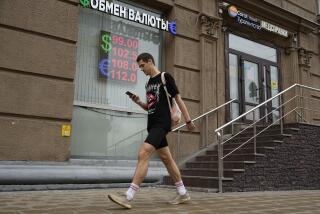Ruble Recall Plot Thickens; Bank Chief Urged to Quit
- Share via
MOSCOW — Cries of conspiracy and calls for Russia’s Central Bank chairman to resign mounted on Wednesday as the plot thickened in the political crisis touched off by Moscow’s sudden recall of old rubles.
The leadership of Russia’s Parliament declared that the weekend order invalidating all pre-1993 rubles should be ignored and said it will move quickly to give its ruling legal force, according to the Interfax news agency.
But Russian Central Bank Chairman Viktor V. Gerashchenko maintained that only the bank could change or amend the currency recall--and there was no sign that it was willing to do so.
Despite the confusion on high and silence from President Boris N. Yeltsin, Russians continued to clog banks trying to exchange the $100 worth of pre-1993 rubles they are permitted to convert into new bills. Bank officials said that more than 400 billion old rubles--$400 million--have already been withdrawn from circulation.
Although the ruble reform appeared to be going ahead without major hitches, the political ripples it produced seemed to be growing.
Parliament leaders reportedly named Yeltsin, Prime Minister Viktor S. Chernomyrdin and Gerashchenko as the culprits who should be “brought to account” for the shock reform.
Finance Minister Boris G. Fyodorov demanded Gerashchenko’s resignation Wednesday and hinted that the Central Bank could have engineered the recall to launder money and cover up its own shady doings.
Fyodorov said he is concerned that the ruble move would so frighten Russia’s partners and donors in the West that $1.5 billion in aid money expected this September could be delayed.
The Central Bank order invalidating all pre-1993 rubles as of last Monday came out of the blue over the weekend, catching many Russians--including Yeltsin himself--on vacation or away for the weekend. Yeltsin, who appears to have known about the plan only in general terms, returned to Moscow and issued a decree softening the conditions of the ruble recall but did not revoke it.
More to Read
Sign up for Essential California
The most important California stories and recommendations in your inbox every morning.
You may occasionally receive promotional content from the Los Angeles Times.










